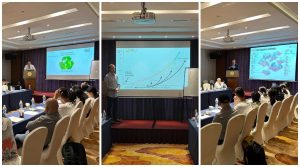On May 6th 2023, I participated in an interesting seminar in Shenzhen on the topic of compliance for manufacturers, with a special focus on upcoming EU regulations. It was organized by Clive Greenwood from SMC. The keynote speaker was Sean Li from the BSI. I did a presentation on product compliance-related activities all along the NPI process.
What risks does a China-based manufacturer run when it makes a product that is not compliant with the export country’s laws?
One interesting topic that came up was, “What risks does a China-based manufacturer run when it makes a product that is not compliant with the export country’s laws?”.
In general, the manufacturer must ask questions and ensure the products made are compliant with both the manufacturing and the importing countries. They have to live up to a certain professional standard, and they have a duty to inform their customers when they make the wrong decisions.
But that’s theoretical. Let’s be more concrete. There are two important things to look at.
- Let’s say a product is sold in the EU. The importer has the ‘economic operator’ role of “manufacturer” because their branding is on the product. It means that, from the EU’s perspective, the importer has ultimate responsibility for the safety & compliance of the product. HOWEVER, based on what the manufacturing agreement includes, the importer could still sue the factory that made the product.
- The “design authority” is the party that provides the product requirements and that, in fine, approves the design. If the manufacturer mentions certain risks (and keeps records of those messages), and if the importer is the design authority, the importer should not sue the manufacturer if one of those risks leads to a situation of non-compliance and any associated issues (recall, lawsuit…). HOWEVER, based on what the development agreement says, the importer may still be able to sue the manufacturer.
Does it make sense? Have you seen similar situations?
(Important disclaimer: this not legal advice and it will differ depending on the jurisdiction. Consult a lawyer!)
P.S.
By the way, Clive and Sean both joined me on a recent episode of the Sofeast podcast: How ISO 37301 Might Improve Chinese Suppliers’ Compliance, so you can listen to that to learn even more about ISO 37301 and compliance.
You may also like:

